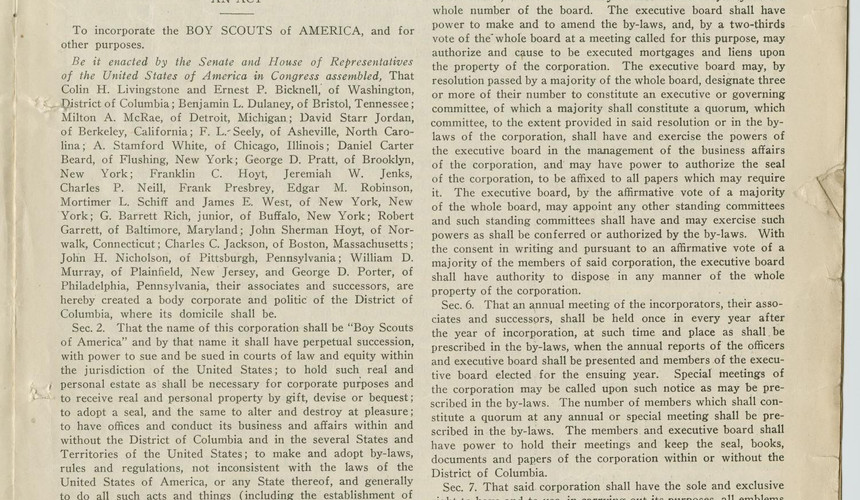Honoring the Congressional Charter of the Boy Scouts of America: June 15, 1916
- troop0176scoutmast
- May 16, 2025
- 5 min read
On June 15, 1916, President Woodrow Wilson signed into law one of the most critical milestones in the history of the Boy Scouts of America (BSA): a Congressional Charter formally recognizing the organization as a federally chartered corporation. This act of Congress not only cemented the Boy Scouts' national role in youth development but also ensured its enduring legacy as a pillar of American civic life.
A Federal Recognition of Purpose
The “Act to Incorporate the Boy Scouts of America and for Other Purposes” granted a federal charter to the Boy Scouts of America (BSA), officially recognizing the organization as a nationally chartered nonprofit with a mission to build character, citizenship, and practical skills in the nation’s young men. This act of Congress placed the BSA among a select group of patriotic and educational organizations, giving it a special status that affirmed its unique role in shaping generations of American youth.
This legislation was passed during the First Session of the Sixty-Fourth Congress. It came at a time when the United States was grappling with its identity on the world stage, preparing for the possibility of entering World War I. In this climate, Congress saw the need to support institutions that could strengthen the character and preparedness of America’s young people. The Boy Scouts of America, just six years old then, had already demonstrated its potential to meet that need through a growing network of local councils, troop leaders, and volunteers nationwide.
Scouting Magazines News Coverage of the Charter - Credit to Aaron on Scouting - Retrieved From https://blog.scoutingmagazine.org/2016/06/15/june-15-1916-woodrow-wilson-made-bsa-official/
The Mission Enshrined in Law
The charter outlined the organization’s purpose clearly and directly. It stated that the BSA existed “to promote, through organization, and cooperation with other agencies, the ability of boys to do things for themselves and others, to train them in Scoutcraft, and to teach them patriotism, courage, self-reliance, and kindred virtues.” In these words, the U.S. Congress codified what millions of Scouts, leaders, and parents already understood—that the Boy Scouts of America offered more than campfires and badges. It was a movement dedicated to fostering the moral and civic growth of the nation’s youth.
Incorporated as a body politic in the District of Columbia, the BSA was given broad authority to own property, adopt bylaws, receive gifts and bequests, and carry out its mission in all fifty states and territories. It also received the exclusive right to use its own emblems, badges, insignia, and other marks—an important legal protection that would help preserve the organization's identity and integrity as it expanded.
The Founding Leaders
The act named 28 founding incorporators, including prominent figures like:
Daniel Carter Beard – Founder of the Sons of Daniel Boone and a key figure in American Scouting.
James E. West – The first Chief Scout Executive.
Edgar M. Robinson – Early champion of Scouting within the YMCA.
George D. Pratt, Milton A. McRae, and many others from nationwide.
These individuals formed the first Executive Board, which led the newly incorporated organization and established its governance structure.
The act named twenty-eight men as the first members of the Executive Board and incorporators of the organization. These individuals were leaders from across the country and from many walks of life, united by their belief in the power of Scouting to mold boys into capable, trustworthy, and service-minded citizens. Among them were Daniel Carter Beard, the founder of the Sons of Daniel Boone and one of the foremost pioneers of the American Scouting movement; James E. West, who would go on to serve as the BSA’s first Chief Scout Executive; and Edgar M. Robinson, a key figure in the YMCA who helped lay the foundations of Scouting in America.
This newly formed Executive Board was empowered to manage all aspects of the organization’s business and affairs. The charter gave the board the authority to adopt and amend bylaws, create standing committees, authorize financial decisions, and fill vacancies. The Executive Board could also designate a governing committee to act on its behalf when needed. By building in this flexible but accountable structure, Congress ensured that the BSA would be governed effectively while maintaining a strong foundation of citizen leadership.
Governance and Operations
The act provided detailed instructions on:
Executive Board powers, including the authority to create bylaws and standing committees.
Annual reporting to Congress, ensuring accountability and transparency.
Quorum and meeting rules, giving structure to the organization’s internal operations.
Trademark protection, granting the BSA exclusive rights to its symbols, badges, and phrases.
The act also mandated that the Boy Scouts of America submit an annual report to Congress, summarizing the organization’s activities and financial condition for the previous year. This requirement established a tradition of transparency and accountability that reflected the public trust in the movement. While not financially supported by the government, the BSA was expected to uphold its responsibilities as a chartered organization serving the public good.
Another key element of the charter was its prohibition on pecuniary profit. The act explicitly stated that the BSA could not issue stock or pay dividends. Its mission was to remain entirely benevolent, educational, and nonprofit. Any assets or income the organization receives would be used solely to further its purpose, not to enrich its members. This stipulation protected the BSA’s focus and values as it grew in size and influence over the years.
Nonprofit and Patriotic by Design
The charter gave the organization a stable legal identity and the ability to evolve while remaining anchored in its founding principles. The Executive Board was given the power to amend its bylaws, allowing it to adapt to changing needs over time. The act also permitted the BSA to accept the assets and assume the debts of any previous Scouting organization, effectively consolidating the movement under a single, federally recognized body.
Congress also retained the right to amend, repeal, or alter the charter at any time. This provision preserved a measure of legislative oversight, reflecting the seriousness with which Congress regarded the privileges being granted. It also recognized that the BSA, while independent in its operations, carried with it a national responsibility.
Legacy and Reflection
The charter of June 15, 1916, was more than a legal formality. It was a declaration that the Boy Scouts of America had earned a place among the enduring institutions of American civic life. In the following decades, millions of young people would wear the uniform, take the Scout Oath, and strive to live by the Scout Law. They would learn the skills of outdoor life, perform acts of service, and grow into adults who understood the value of duty, kindness, and leadership.
Today, as the BSA continues to evolve and expand its mission to serve all youth, the Congressional Charter reminds us of the organization’s roots and enduring purpose. The principles enshrined in that 1916 Act remain as relevant as ever. In an era when our communities face complex challenges and our youth navigate unprecedented pressures, the ideals of Scouting offer a steady compass.
The date of June 15 deserves to be remembered and celebrated by Scouts and Scouters alike. It marks the moment when the United States government officially recognized the importance of preparing young people to lead lives of service, courage, and character. It also reminds us that the strength of the Boy Scouts of America lies not only in its programs or policies, but in the millions of volunteers and youth who bring its mission to life, year after year.
As we reflect on more than a century of service, let us honor the vision and foresight of those early leaders and renew our commitment to building a better future—one Scout at a time.
Full Text of the Charter can be found here.












Comments